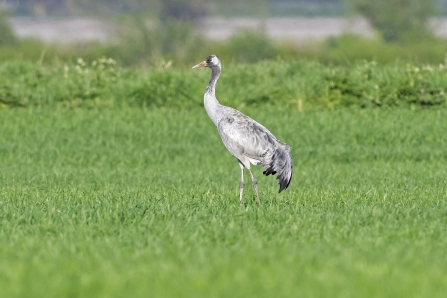
Common Crane Clayworth Common credit Mike Vickers

Common Crane Clayworth Common credit Mike Vickers
Life is looking up for weasels, woodpeckers and thousands of other wildlife species, as a third of the UK’s Wildlife Trusts have been helped by over £1million in emergency National Lottery grants during the coronavirus (Covid-19) crisis.
The 15 trusts look after 652 nature reserves across England and Wales, and Heritage Emergency Fund grants of £1.19m have helped to keep them open throughout lockdown, providing vital safe spaces for people to get outdoors, exercise and enjoy nature. It has also funded salaries for key staff such as wardens, helped to protect rare and ‘at risk’ wildlife, and supported the Trusts in carrying out further fundraising and planning for the future.
This significant support reflects our belief that the UK needs a strong network of wildlife and nature charitiesRos Kerslake, Chief ExecutiveNational Lottery Heritage Fund
Ros Kerslake, Chief Executive, National Lottery Heritage Fund, said: “This significant support reflects our belief that the UK needs a strong network of wildlife and nature charities, as they are at the forefront of helping us to invest in habitat and species conservation. It is their boots on the ground, skills, expert knowledge and people engagement skills that help us ensure National Lottery players’ money really makes a critical difference for people and nature. Wildlife Trusts have been at the forefront of showing how nature can improve people’s quality of life during lockdown.”
Wildlife Trusts are facing an unprecedented challenge, coronavirus has impacted financesCraig Bennett, Chief ExecutiveThe Wildlife Trusts
Craig Bennett, Chief Executive of The Wildlife Trusts said: “Wildlife Trusts are facing an unprecedented challenge, coronavirus has impacted finances and in places put conservation work on hold, whilst also increased demand on our wild places, as people have turned to nature to help them through these difficult times.
“We are hugely grateful to the National Lottery Heritage Fund for giving over £1m from their emergency fund to help fifteen Wildlife Trusts who have been badly affected. Local nature reserves are especially important to communities, and it’s particularly welcome and appropriate that the National Lottery Heritage Fund is supporting Trusts in this way, enabling them to continue their work for wildlife and people, and for nature’s recovery.”
When lockdown started, the Wildlife Trusts immediately lost much of their key income. The Wildlife Trust of South & West Wales earn over half of their income from tourism, and lockdown left them with a gap in their budget of more than £500,000. Across the Trusts, visitor centres closed immediately, many staff were furloughed and where nature reserves remained open, lower levels of staffing meant that some reserves suffered from antisocial behaviour such as littering, fires and fly-tipping and trampling of meadows.
The grants from the National Lottery Heritage Fund are helping to cover a wide range of costs, from basic repairs and essential habitat maintenance to bringing back core staff, reopening visitor centres and moving resources online.
Examples include:
Many Trusts have noticed that lockdown has encouraged people to reconnect with nature.
North Wales Wildlife Trust fundraising director, Dr Graeme Cotterill, said: “The requirement for people to stay local has undoubtedly reduced disturbance at key sites but also re-connected people with their local wildlife wonders. We’ve been inundated with enquiries and requests to help with wildlife identification – things that people had never had the chance to stop and notice before, with orchids, butterflies and caterpillars seeming to particularly catch the public’s attention.”
The Wildlife Trust for Birmingham and The Black Country noticed that more people were connecting with nature during lockdown, sharing photos on social media of wildlife in their gardens and exploring new wild spaces locally. The city ranked 31st out of 244 cities in the world for its wildlife in a global observation challenge, with highlights including green-winged orchids found growing in unmown verges in Kings Norton, a lesser-spotted woodpecker and weasel in Harborne, otter poo along a canal in Walsall and lots of butterflies.
Nottinghamshire Wildlife Trust say that more people than ever before have been visiting their reserves. A volunteer warden at their flagship Idle Valley Nature Reserve, Mike Vickers, used the extra time during lockdown to make a stunning photographic record of the wildlife, including a rare crane.
The past few months have been really challenging and the support of Heritage Emergency Fund has been a tremendous boost. As well as helping us cope with the immediate financial challenges presented by the pandemic this support will enable us to confidently plan for the future and ensure that we can engage more people than ever before in efforts to create a wilder Nottinghamshire and to tackle the climate and biodiversity emergencies.Paul Wilkinson, Chief ExecutiveNottinghamshire Wildlife Trust
The full list of Wildlife Trusts that have received emergency funding are:
The Heritage Emergency Fund has also supported several independent wildlife charities, including The Hebridean Whale and Dolphin Trust, The Froglife Trust and Organisation Cetacea.
The £50 million Heritage Emergency Fund was set up at speed in late April to help the UK’s heritage survive the significant impact of the COVID-19 epidemic. Thanks to money raised by National Lottery players, 444 applications funded worth over £20.5m have now been awarded, addressing immediate pressures for those most in need. Organisations have until the end of July to apply.